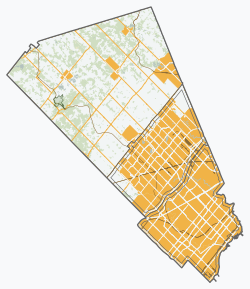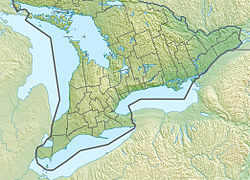Mississauga | |
|---|---|
| City of Mississauga | |
From top, left to right: Mississauga City Centre, the Mississauga Civic Centre, Health Sciences Complex at the University of Toronto Mississauga, Old Grammar School in Streetsville, the Credit River, 282 Church Street, and Absolute World towers, the St. Lawrence bay in Port Credit, and the M City Condominiums | |
| Motto(s): Pride in our past, faith in our future
Leading Today for Tomorrow | |
| Coordinates: 43°36′N 79°39′W / 43.600°N 79.650°W | |
| Country | Canada |
| Province | Ontario |
| Region | Peel |
| Toronto Township | 1805 |
| Town of Mississauga | 1968 |
| Incorporation as the City of Mississauga | 1974 |
| Government | |
| • Mayor | Carolyn Parrish |
| • Council | Mississauga City Council |
| • MPs | List of MPs |
| • MPPs | List of MPPs |
| Area | |
| • Total | 292.43 km2 (112.91 sq mi) |
| Elevation | 156 m (512 ft) |
| Population | |
| • Total | 717,961 (7th) |
| • Density | 2,467.60/km2 (6,391.1/sq mi) |
| Time zone | UTC−05:00 (EST) |
| • Summer (DST) | UTC−04:00 (EDT) |
| Forward sortation area | |
| Area code(s) | 905, 289, 365, and 742 |
| Demonym |
|
| Website | www |
Mississauga (/ˌmɪsɪˈsɔːɡə/ MISS-iss-AW-gə)[3] is a Canadian city in the province of Ontario. Situated on the western shore of Lake Ontario in the Regional Municipality of Peel, it borders Toronto (Etobicoke) to the east, Brampton to the north, Milton to the northwest, and Oakville to the southwest. Although Mississauga was initially a car-centric city, significant strides have been made to improve walkability and add cycling lanes, with most major arteries having bi-directional bike lanes. The city's downtown is home to several transit hubs, such as Square One Bus Terminal, and the City Centre Transit Terminal. With a population of 717,961 as of 2021, Mississauga is the seventh-most populous municipality in Canada, third-most in Ontario, and second-most in the Greater Toronto Area (GTA) after Toronto itself.[4][5] However, for the first time in its history, the city's population declined according to the 2021 census, from a 2016 population of 721,599 to 717,961, a 0.5 per cent decrease.[1]
The growth of Mississauga was initially attributed to its proximity to Toronto.[6] However, during the latter half of the 20th century, the city attracted a diverse and multicultural population. Over time, it built up a thriving, transit-oriented central business district of its own, which is now known as Mississauga City Centre.[7][8] Malton, a neighbourhood of the city located in its northeast end, is home to Toronto Pearson International Airport, Canada's busiest airport, as well as the headquarters of many Canadian and multinational corporations. Mississauga is not a traditional city, but is instead an amalgamation of three former villages, two townships, and a number of rural hamlets (a general pattern common to several suburban GTA cities) that were significant population centres, with none being clearly dominant, prior to the city's incorporation that later coalesced into a single urban area.[9]
Indigenous people have lived in the area for thousands of years and Mississauga is situated on the traditional territory of the Huron-Wendat, Haudenosaunee and Anishinaabeg people, including the namesake Mississaugas.[10] Most of present-day Mississauga was founded in 1805 as Toronto Township[11] within York County, and became part of Peel County when new counties were formed by splitting off parts of the original county in 1851. Mississauga itself was established in 1968 as a town, and was reincorporated as a city in 1974, when Peel was restructured into a regional municipality.[12]
- ^ a b "Census Profile, 2021 Census Mississauga Population". Census Canada. 9 February 2022. Retrieved 9 February 2022.
- ^ "Demonyms—From coast to coast to coast — Language articles — Language Portal of Canada". Noslangues-ourlanguages.gc.ca. Archived from the original on 30 August 2014. Retrieved 24 August 2014.
- ^ Dictionary Reference: Mississauga, The Free Dictionary: Mississauga
- ^ "Mississauga (Code 3521005) Census Profile". 2016 census. Government of Canada - Statistics Canada.
- ^ "Mississauga, City Ontario (Census Subdivision)". Census Profile. Statistics Canada. 8 February 2012. Retrieved 8 February 2012.
- ^ "Three large urban areas: the Montreal and Vancouver CMAs and the Greater Golden Horseshoe". Statistics Canada, 2007 Census of Population. 13 March 2007. Archived from the original on 15 March 2007. Retrieved 22 March 2007.
Mississauga (668,549), a suburb of Toronto...
- ^ "Downtown21 Master Plan" (PDF). City of Mississauga. April 2010. Retrieved 27 April 2013.
- ^ "Mississauga City Centre Urban Growth Centre". Government of Ontario. Archived from the original on 2 April 2015. Retrieved 27 April 2013.
- ^ "Founding Villages – Heritage Mississauga". Retrieved 20 August 2020.
- ^ "Mississauga | The Canadian Encyclopedia". Thecanadianencyclopedia.ca. Retrieved 16 June 2021.
- ^ "History of Mississauga" (PDF). 5.mississauga.ca. Retrieved 7 June 2022.
- ^ "About Peel". Peelarchivesblog.com. 8 May 2015. Retrieved 7 June 2022.












